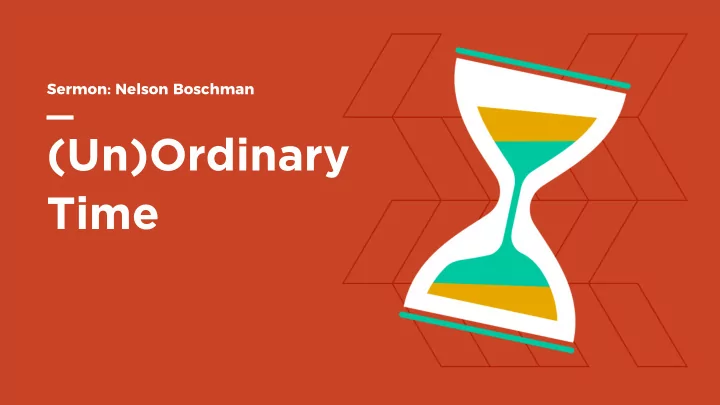

Sermon: Nelson Boschman — (Un)Ordinary Time
Matthew 14:13-21
When the gospel writers want to sum up Jesus’ entire ministry, they frequently say things like this: Jesus “announced the good news of the kingdom and healed every disease and sickness among the people” (Matthew 4:23). This “kingdom,” the primary topic of Jesus’ parables and teachings, is shorthand for a world at peace, fully aligned with God’s more beautiful design. Through his ministry, Jesus announces to people that this kingdom is close, that the new world is coming soon.
The healings and miracles he performs are not incidental to his message but a demonstration of it. They’re the appetizer course, the first tastes of the new world, of what reality will be when all creation is finally brought into full submission to the rule of Christ. Not everything is yet as it should be, but wherever people begin to gather in shared allegiance to Jesus, the first sprouts of the new world start to spring up and grow. Meghan Larissa Good
How might this ancient story offer us a preview of the world God’s Spirit is bringing into being?
Matthew 14:13
Matthew 14:14
Matthew 14:15
Matthew 14:16
We open to God by doing it wrong more than by doing it right. The call is to divine union more than private perfection. Richard Rohr
Matthew 14:17
Maybe that foreboding machine of injustice in our cities, in our [neighbourhoods], in our world, needs to meet the foreboding image of a woman harnessing whatever resource she has, loading it up in her slingshot and hurling it right into its spinning cogs. Osheta Moore
Matthew 14:18-19
Food, bread in particular, seems to be used to symbolize fullness and satisfaction in God. It’s God feeding us, rather than us being food for God. It’s God caring about our very mundane and immediate needs for “daily bread.” God is offering us abundance rather than mere fear- based, subsistence religion, which I often call “fire insurance” religion. Richard Rohr
Matthew 14:20-21
Invitations
In the story of the feeding of the 5,000 we see Jesus once again addressing the most essential, physical needs of his fellow human beings - hunger, thirst, companionship - and once again, breaking down every socially- constructed barrier that keeps us from eating with one another.
He did the same thing when, much to the chagrin of the religious leaders, he dined with tax collectors and prostitutes and told his more well-to-do hosts that “when you give a banquet, invite the crippled, the lame, the blind, and you will be blessed.” Rachel Held Evans
We may have big dreams and a small offering, but we follow a remarkably resourceful God. Osheta Moore
Recommend
More recommend